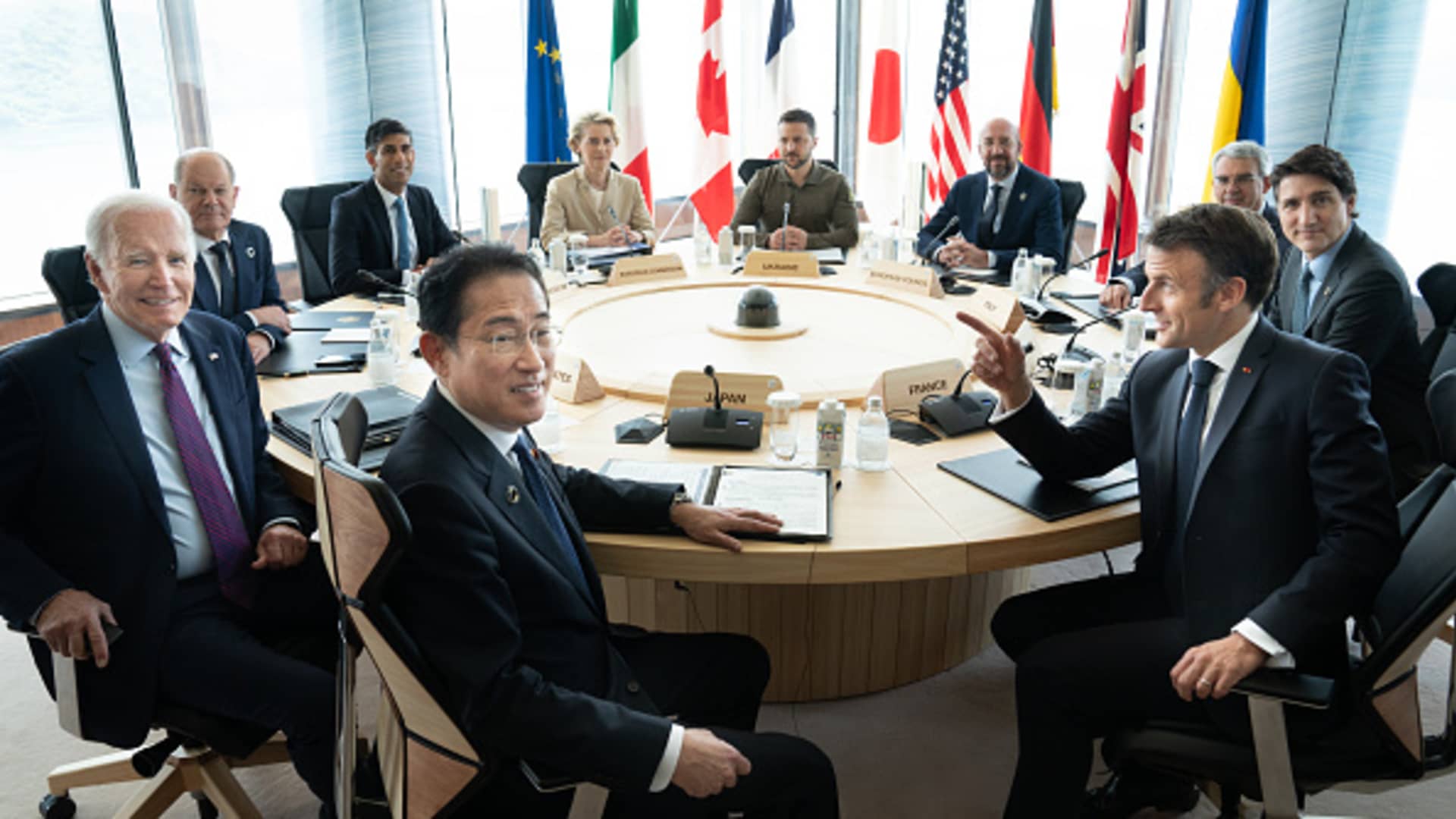
A simple principle underpins a contentious Thursday decision by the U.S. and key allies to tap profits from Russian sovereign assets in support of Ukraine: Moscow must make reparations.
“Russia has to pay,” European Council President Charles Michel told CNBC’s Steve Sedgwick, after the leaders of the Group of Seven (G7) major democracies agreed in principle to issue $50 billion in loans for Ukraine that are backed by the profits generated by roughly 300 billion euros ($322 billion) of Russian central bank assets frozen by the West.
The G7 comprises the U.S., Canada, U.K., France, Germany, Italy and Japan.
U.S. President Joe Biden publicly broadcast the “significant outcome” of the G7’s consensus during a Thursday press briefing beside his Ukrainian counterpart Volodymyr Zelenskyy, after the two leaders signed a 10-year bilateral security agreement.
“I’m very pleased to share that this week the G7 signed a plan to finalize and unlock $50 billion from the proceeds of those frozen [Russian] assets, to put that money to work for Ukraine, [in] another reminder to Putin that we’re not backing down,” Biden said.
Moscow has previously denounced such a move, warning of dramatic consequences if Western leaders go ahead with the proposal. Questions have also been raised over the legality of setting such a precedent: Russia has been cut off from its frozen assets, but retains their ownership. A lengthy judicial process would have to be undertaken for their forfeit — but the profits generated by the seized assets are more readily available.
A similar step to the G7 decision was taken in 1992, when the U.N. Security Council authorized a measure to seize frozen Iraqi assets and direct them to compensate the victims of Baghdad’s invasion of Kuwait.
Michel holds firm on the grounds of the decision. “There is a blatant violation of international law, there is a blatant aggression against Ukraine. [Moscow] are the aggressor, there is a victim, there are rules at an international level. They have to pay,” he said.
“And that’s why … this money is blocked, that’s why this money is frozen, and I am very confident that we can use this money to support Ukraine, because it is fair.”
The proposal must now pass various legal hurdles and be backed by European states, where the majority of frozen Russian assets are held.
Michel said that G7 allies can finalize the deal’s details “in the weeks to come” to make the funds available for Kyiv as soon as possible, noting that “50 billion euros in addition for Ukraine, it means more military equipment and more capacities and capabilities for Ukraine to defend themselves and to defend our common European values.”
Further loans secured against the interest accrued by Russian frozen assets could be forthcoming, U.S. Treasury Secretary Janet Yellen signaled on Thursday.
“This is not the last time this can be done. This is the first tranche and if necessary, there’s more behind it,” said Yellen, who has been actively involved in negotiating the agreement. “We’re getting Russians to help pay for the damage that it’s caused.”
Well into its third year, Russia’s full-fledged invasion of Ukraine has demolished settlements and key infrastructure in the country, amid persistent aerial bombardment. The World Bank in February estimated that $486 billion will be required to cover the reconstruction and recovery of Ukraine over the next decade — with costs likely to have increased since this assessment.
Increasingly, Kyiv’s allies have come to accept that war must come before peace in discussions about Ukraine’s reconstruction.
“I think if we want to make possible the rebuilding of Ukraine as soon as possible, we need to provide more air defense systems, this is a top priority,” Michel said. “And today it is also an important decision, how we can provide more support, more military equipment to the Ukrainians, including in the field of air defense.”
A formal G7 statement is expected at the end of Friday, crowning a two-day summit in Borgo Egnazia in Puglia, Italy, which welcomed top EU officials, including Ursula von der Leyen, the president of the European Commission, as well as a number of other heads of state and international organizations.
The annual summit comes as most of the G7 leaders face their own domestic upheavals including national elections and falling approval ratings. Only Georgia Meloni, the prime minister of Italy, is riding high in the polls after her nationalist party Fratelli d’Italia’s success in the European Parliament elections last weekend.




